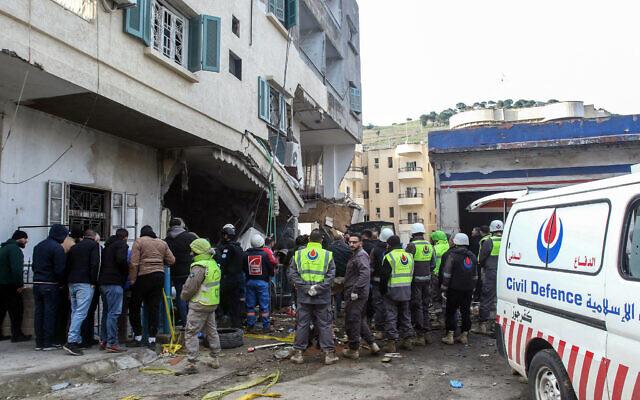
Hezbollah vows revenge after 10 civilians said killed in south Lebanon strikes
Ten civilians and three Hezbollah terrorists were killed by Israeli strikes on villages across southern Lebanon on Wednesday, a hospital director and Lebanese security sources said, as the terror group vowed to “make Israel pay.”
Israel said it carried out the widespread strikes in response to a Hezbollah rocket attack on an army installation and city in northern Israel that killed an IDF soldier and injured eight others.
The bombardments marked the deadliest day in more than four months of cross-border exchanges, further raising fears of a broader conflict between Israel and the Iran-backed terror group. Israeli bombardments continued Thursday, with the terror group announcing another three members killed, on top of the three killed Wednesday.
Since October 8, Hezbollah-led forces have attacked Israeli communities and military posts along the border on a near-daily basis, with the group saying it is doing so to support Gaza amid the war there.
The dead in Lebanon included at least three children, sources said.
In the village of Sawana, a woman and her two children were killed in an Israeli strike, two security sources said.
A strike on a building in Nabatieh killed seven members of a family, according to the state-run National News Agency. The dead were identified as apartment owner Hussein Berjawi, his wife, two daughters, his sister a niece and a grandson.
The agency said the Israeli strike, carried out by “a drone with a guided missile,” caused severe damage to the three-story apartment building, warning it could collapse and reporting damage to nearby buildings, vehicles, and infrastructure.
Neighbor Hussein Badir said he and other neighbors had rushed to the street to dig through the rubble. He said the family was “decent and respectable” and “not involved in anything.”
An AFP correspondent at the scene said authorities had cordoned off the area.
At least three Hezbollah fighters were killed in separate strikes Wednesday, according to the group and security sources.
Hassan Fadlallah, a senior Hezbollah official and member of parliament, said on Thursday that Israel would face reprisal for the strikes.
“The enemy will pay the price for these crimes,” Fadlallah told Reuters when asked about the Iran-backed group’s reaction.
Despite the threat, the Israel Defense Forces said it was continuing to strike dozens of Hezbollah sites in south Lebanon Thursday, including rocket launching positions, buildings, and other infrastructure used by the terror group in the Wadi Saluki area.
The IDF said it also hit sites used by the terror group earlier Thursday and late Wednesday in Labbouneh and Taybeh.
Hezbollah said later that three members had been killed in the strikes, bringing its death toll since fighting began in October to 199.
Wednesday’s strikes came in response to rocket barrages from Lebanon on Wednesday morning that killed Staff Sgt. Omer Sarah Benjo, 20, and wounded eight others in and near the Galilee city of Safed. Hezbollah did not claim the attack.
A day earlier, a woman and her teen son were seriously injured when they were hit by a rocket in Kiryat Shmona, closer to the border with Lebanon.
“As we have made clear time and time again, Israel is not interested in a war on two fronts. But if provoked, we will respond forcefully,” said government spokesperson Ilana Stein.
“The current reality, where tens of thousands of Israelis are displaced and cannot return to their homes, is unbearable. They must be able to return home and live in peace and security.”
A total of 11 unguided Grad rockets were fired in the attack Wednesday, according to military assessments.
Nine slammed into open areas, while two hit infrastructure and were not intercepted by the Iron Dome air defense system, including one that struck the IDF base, killing Benjo.
Benjo and several more soldiers were running to a bomb shelter when the rocket struck the base. The IDF was investigating if there was enough time from when sirens sounded for people in Safed to seek shelter.
Fears have been growing of another full-blown conflict between Israel and Hezbollah, who last went to war in 2006.
Hezbollah head Hassan Nasrallah said in a televised address on Tuesday that his group would only stop its exchanges of fire if a full ceasefire was reached for Gaza.
The UN secretary-general’s spokesman Stephane Dujarric warned that “the recent escalation is dangerous indeed and should stop.”
IDF chief of staff Herzi Halevi, who had been meeting the heads of local municipalities in northern Israel on Wednesday, said that despite what he described as achievements against Hezbollah, this was “not the time to stop.”
So far, the skirmishes on the border have resulted in six civilian deaths on the Israeli side, as well as the deaths of 10 IDF soldiers and reservists. There have also been several attacks from Syria, without any injuries.
Hezbollah has named 199 members who have been killed by Israel during the ongoing skirmishes, mostly in Lebanon but some also in Syria.
In Lebanon, another 29 operatives from other terror groups, a Lebanese soldier, and some two dozen civilians, three of whom were journalists, have been killed.
The fighting has also displaced tens of thousands of people in the border areas of each country.
War erupted in Gaza with Palestinian terror group Hamas’s October 7 massacre, which saw some 3,000 terrorists burst across the border into Israel from the Gaza Strip by land, air, and sea, killing some 1,200 people and seizing over 250 hostages, mostly civilians. Entire families were executed in their homes, and over 360 people were slaughtered at an outdoor festival, many amid horrific acts of brutality by the terrorists.
Israel has warned it will no longer tolerate the presence of Hezbollah along the Lebanon frontier, where it could attempt to carry out an attack similar to the massacre committed by Hamas on October 7.
Source » timesofisrael.com





